| dc.description.abstract | Adult education broadly refers to continuing education latet'in life. This can include learning in direct relation to a new or ongoing career of an individual, or studies that are completely unrelated such as languages. With the development of online learning, adult . education is becoming increasingly accessible, and although the generas process of teaching and learning is similar between children and adults, there are additional factors that can be seen to affect those who continue their studies into adulthood. Adult literacy is important for any country's economic and social development. For various reasons not all adults in any community are literate. All over the world the problem of illiteracy has not been solved despite major improvements made in the education sector.
In Kenya, the govermnent has an elaborate structure to tackle more centres and hiring of facilitators but enrolment figures have continued to be low despite statistics showing that there are over 4 million adults who are illiterate. The purpose of this study was therefore to investigate factors influencing the implementation of adult literacy programmes in Murang'a East District. The study investigated how age and gender of the learners influence the implementation of the progammes and what motivates the adult learners among others.
The study was motivated by the high number of illiterate adults in Murang'a East District despite the presence of ACE centres. There was also the need to find out why adults enroll but do not attend classes in the ALPs. Other areas included different views on adult literacy, importance of adult literacy and provision of adult literacy. The study was conducted in Murang'a East District of Murang'a County. Data was collected from the adult learners, adult educators and the District Adult and Continuing Education Officer (DACEO) by use of questionnaires and interview guide. The data was then analyzed using SPSS software programme and presented in tables and pie charts.
The findings revealed that there are several intra and extra institutional factors that influence the implementation of ALPs in Murang'a East Districi.Provision of free primary education, inadequate teaching/learning facilities, lack of motivation among the educators and lack of funds are among the factors that influence the implementatio~ of these programmes. In view of these, the study recommended further study on tlfis area and especially on the intra institutional factors which could be easily identified with regular supervision and visits to the adult literacy centres. | en_US |

